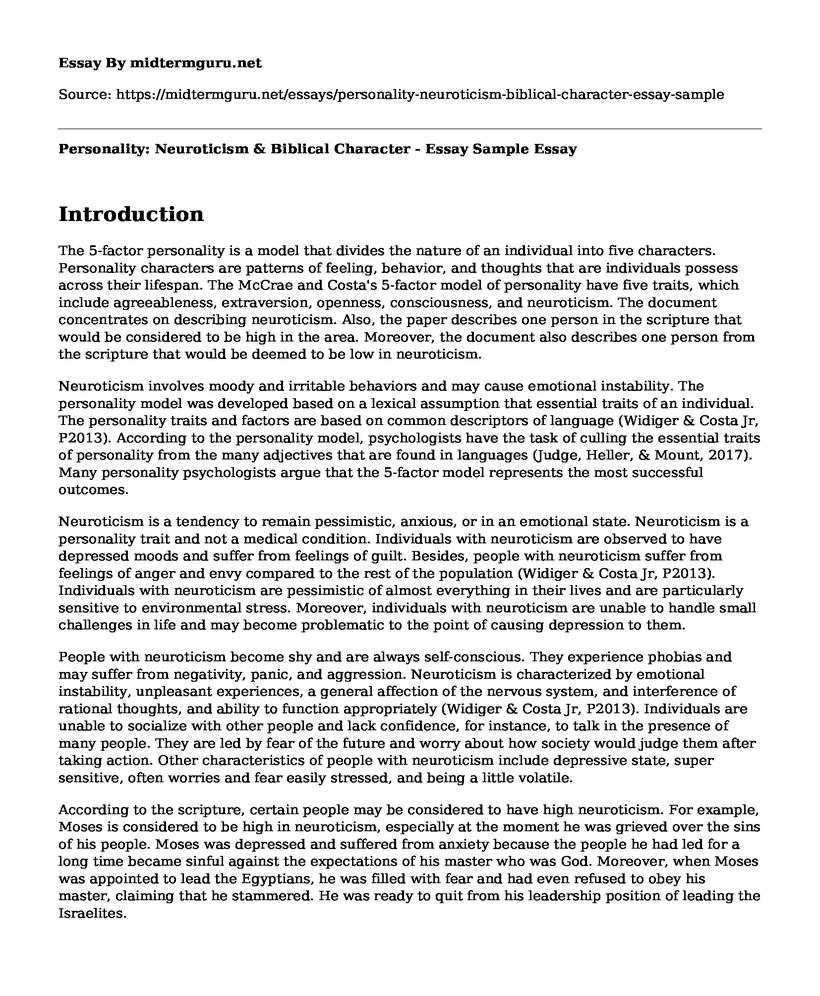Introduction
The 5-factor personality is a model that divides the nature of an individual into five characters. Personality characters are patterns of feeling, behavior, and thoughts that are individuals possess across their lifespan. The McCrae and Costa's 5-factor model of personality have five traits, which include agreeableness, extraversion, openness, consciousness, and neuroticism. The document concentrates on describing neuroticism. Also, the paper describes one person in the scripture that would be considered to be high in the area. Moreover, the document also describes one person from the scripture that would be deemed to be low in neuroticism.
Neuroticism involves moody and irritable behaviors and may cause emotional instability. The personality model was developed based on a lexical assumption that essential traits of an individual. The personality traits and factors are based on common descriptors of language (Widiger & Costa Jr, P2013). According to the personality model, psychologists have the task of culling the essential traits of personality from the many adjectives that are found in languages (Judge, Heller, & Mount, 2017). Many personality psychologists argue that the 5-factor model represents the most successful outcomes.
Neuroticism is a tendency to remain pessimistic, anxious, or in an emotional state. Neuroticism is a personality trait and not a medical condition. Individuals with neuroticism are observed to have depressed moods and suffer from feelings of guilt. Besides, people with neuroticism suffer from feelings of anger and envy compared to the rest of the population (Widiger & Costa Jr, P2013). Individuals with neuroticism are pessimistic of almost everything in their lives and are particularly sensitive to environmental stress. Moreover, individuals with neuroticism are unable to handle small challenges in life and may become problematic to the point of causing depression to them.
People with neuroticism become shy and are always self-conscious. They experience phobias and may suffer from negativity, panic, and aggression. Neuroticism is characterized by emotional instability, unpleasant experiences, a general affection of the nervous system, and interference of rational thoughts, and ability to function appropriately (Widiger & Costa Jr, P2013). Individuals are unable to socialize with other people and lack confidence, for instance, to talk in the presence of many people. They are led by fear of the future and worry about how society would judge them after taking action. Other characteristics of people with neuroticism include depressive state, super sensitive, often worries and fear easily stressed, and being a little volatile.
According to the scripture, certain people may be considered to have high neuroticism. For example, Moses is considered to be high in neuroticism, especially at the moment he was grieved over the sins of his people. Moses was depressed and suffered from anxiety because the people he had led for a long time became sinful against the expectations of his master who was God. Moreover, when Moses was appointed to lead the Egyptians, he was filled with fear and had even refused to obey his master, claiming that he stammered. He was ready to quit from his leadership position of leading the Israelites.
However, according to the scriptures, some individuals may be considered to have low neuroticism. For instance, Solomon is considered to be low in neuroticism. Solomon lived a happy life and was a king of the Israelites. Besides, he was a courageous leader who married many wives and is usually considered to have been the wisest person in the scripture. He did not fear his enemies neither did he get into depression or anxiety even at the worst of times during his time as a leader. Conclusively, the personality help in explaining differences in personality and the way individuals behave.
References
Judge, T. A., Heller, D., & Mount, M. K. (2017). Five-factor model of personality and job satisfaction: A meta-analysis. Journal of applied psychology, 87(3), 530. Retrieved from https://scholar.google.com/scholar?hl=en&as_sdt=0%2C5&q=5+factor+model+of+personality&oq=5+factor+#d=gs_cit&u=%2Fscholar%3Fq%3Dinfo%3AUZ_rnWkjgoMJ%3Ascholar.google.com%2F%26output%3Dcite%26scirp%3D3%26hl%3Den
Widiger, T. A., & Costa Jr, P. T. (2013). Personality disorders and the five-factor model of personality. American Psychological Association. Retrieved from https://scholar.google.com/scholar?hl=en&as_sdt=0%2C5&q=5+factor+model+of+personality&oq=5+factor+#d=gs_cit&u=%2Fscholar%3Fq%3Dinfo%3AUZ_rnWkjgoMJ%3Ascholar.google.com%2F%26output%3Dcite%26scirp%3D3%26hl%3Den
Cite this page
Personality: Neuroticism & Biblical Character - Essay Sample. (2023, Jan 23). Retrieved from https://midtermguru.com/essays/personality-neuroticism-biblical-character-essay-sample
If you are the original author of this essay and no longer wish to have it published on the midtermguru.com website, please click below to request its removal:
- Trauma Informed Parents: Analysis of the Website
- Feelings of Rejection - Assignment Example
- Paper Example on Racial and Gender Equality
- Research Paper on Healthcare and Poverty
- Essay Sample on Community Interventions Against Tobacco Smoking
- Child Services Should Be Held Accountable for Cases Of Child Abuse - Essay Sample
- Paper Example on Strategic Family Therapy







